Navigation
Install the app
How to install the app on iOS
Follow along with the video below to see how to install our site as a web app on your home screen.
Note: This feature may not be available in some browsers.
More options
You are using an out of date browser. It may not display this or other websites correctly.
You should upgrade or use an alternative browser.
You should upgrade or use an alternative browser.
randy holmes-farley
-

keeping levels stable?
ok I feel like I'm not sure how to maintain my levels at a stable point. I did a water change on May 26 and checked my alk and it read at 9.5 dKH(Hanna) I checked it today and it showed 7.6 dKH(Hanna). I want to keep my levels between 7-8. how would I one keep them stable and how would I dose or...- cwb_reeftank
- Thread
- maintenance randy holmes-farley reef chemistry sps care sps tips
- Replies: 10
- Forum: Reef Chemistry by Randy Holmes-Farley
-

Nitrate or Phosphate?
should I get a good nitrate test kit or a good phosphate test kit first? I would like to get both but I can only get one for right now.- cwb_reeftank
- Thread
- nitrate phosphate randy holmes-farley reef chemistry test kits testing
- Replies: 7
- Forum: Reef Aquarium Discussion
-

Enlighten me ... Randy Recipe (Alk) and Red Sea B
@Randy Holmes-Farley if you may ... and I apologize in advanced if this has been raised in the past. By no means this is to compare between Randy's and Red Sea; I just want to understand. I was looking at your Alkalinity part (recipe #1 and recipe #2) Recipe #1 for pH below 8.3 (bake then...- potatocouch
- Thread
- alkalinity randy holmes-farley
- Replies: 16
- Forum: Reef Chemistry by Randy Holmes-Farley
-

How to balance nitrate and phosphate
Its about three months im dealing with balancing nitrate and phosphate in my reef tank and im steal dealing. This started when i saw my corals loosing their color and i asked in R2R and they say me that the po4 is too low for a tank that has LPS.So i tried to rise my no3 and po4 but i added too...- arman
- Thread
- randy holmes-farley
- Replies: 44
- Forum: Reef Chemistry by Randy Holmes-Farley
-

Alk question
I try to keep my tanks alk between 7-9 but when I use my red sea salt(not the pro) it brings my alk back up to 11. I was wondering if I had a bad batch of salt or something else.- cwb_reeftank
- Thread
- alkalinity randy holmes-farley reef chemistry
- Replies: 7
- Forum: Reef Chemistry by Randy Holmes-Farley
-

Raising my alk
So my cal and alk was on the low end reading at cal-385 and alk -7.2 using regular instant ocean. I decided to switch salts and have been doing large water changes every other day however my alk is going up really slowly compared to my calcium. My calcium is currently at 420 and alk is now at...- Denisk
- Thread
- randy holmes-farley
- Replies: 32
- Forum: Reef Chemistry by Randy Holmes-Farley
-

Mystery just showed up
Any ideas? The shell was clean when I put it in a few days ago and I just noticed this today. I did have some feather dusters on live rock which I haven't seen for a while. This was taken through my microscope - the white part is the clean shell. Total size is 0.5 cm. Thanks.- ThunderGoose
- Thread
- hitchhiker randy holmes-farley
- Replies: 3
- Forum: Hitchhiker & Critter ID
-

Let's talk about increasing phosphates.
After my notices on my corals that every time my phosphates is at zero point,my corals first loose their colors little by little and they bleach at last. So i need a way to increase it to an acceptable range because it is 0 with hanna test kits. I tried feeding my corals and fishes more and more...- arman
- Thread
- randy holmes-farley
- Replies: 18
- Forum: Reef Chemistry by Randy Holmes-Farley
-

start using kalkwasser
Hi my friends.Ive started to use kalk for maintaining my parameteres and have watched related videos related to.The first question is that when i put the kalk in the water in a bottle and shake it,after 6 hours the water wasnt clear.Is it normal or not? The other question(not related to kalk)is...- arman
- Thread
- randy holmes-farley
- Replies: 11
- Forum: Reef Chemistry by Randy Holmes-Farley
-

calcium level
ok I tested my calcium on Monday and it was at 390. I tested it today and it was at 410 and I have not put anything in my tank to raise it. I was wondering what would cause it to do that?- cwb_reeftank
- Thread
- calcium coral care randy holmes-farley reef reef aquarium reef chemistry
- Replies: 5
- Forum: Reef Chemistry by Randy Holmes-Farley
-
E
Help. Used wrong carbon
I have brs catalytic activated carbon for rodi unit and rox carbon for my reactors. I mixed the two and just added the one meant for my rodi unit into my reactors on tank. Does it matter or can cause harm ?- ecam
- Thread
- randy holmes-farley
- Replies: 6
- Forum: Reef Chemistry by Randy Holmes-Farley
-
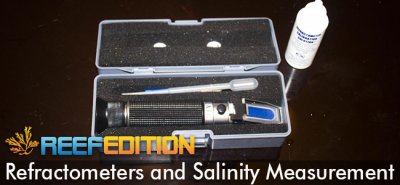
Refractometers And Salinity Measurement
Salinity is one of the most important parameters measured in reef aquaria. It controls not only the salt balance between an organism and its surrounding environment, but also the levels of a host of ions in seawater that aquarists neither measure nor control independently. Consequently...- Randy Holmes-Farley
- Article
- 31 min read
- chemistry randy holmes-farley reef chemistry reef tank refractometer rhf salinity saltwater saltwater aqarium
- Category: Reef Chemistry
-
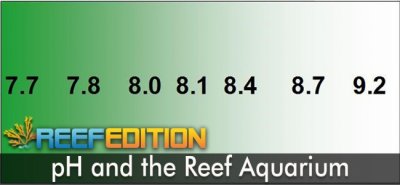
pH And The Reef Aquarium
For many aquarists, pH is not something that they have much experience with aside from their aquarium. For many, pH is almost a black box measurement: something to be considered, but whose physical meaning makes little sense to them. This article will describe pH in an intuitive way (as...- Randy Holmes-Farley
- Article
- 23 min read
- alkalinity randy holmes-farley reef aquarium reef chemistry reef tank rhf saltwater saltwater aqarium
- Comments: 2
- Category: Reef Chemistry
-
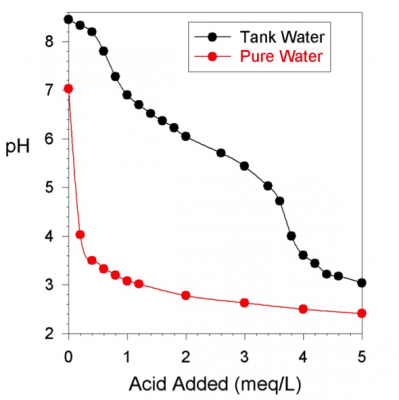
What is Alkalinity?
Most reefkeepers know they need to measure alkalinity, and most know it has something to do with carbonate. But what is alkalinity exactly? Why is it important? How is it measured? This article will answer those questions and give you all of the information that you need to fully understand one...- Randy Holmes-Farley
- Article
- 14 min read
- alk alkalinity randy holmes-farley reef aquarium reef chemistry reef tank rhf saltwater saltwater aqarium
- Category: Reef Chemistry
-
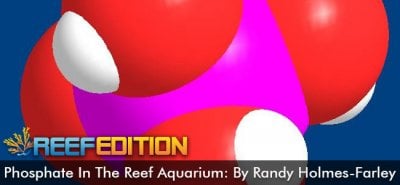
Phosphate in the Reef Aquarium
The phosphorus atom is one of living matter’s basic building blocks. It is present in every living creature and in the water of every reef aquarium. Unfortunately, it is often present in excess in reef aquaria and that excess has the potential to cause at least two substantial problems for...- Randy Holmes-Farley
- Article
- 29 min read
- phosphate po4 randy holmes-farley reef aquarium reef chemistry reef tank rhf saltwater saltwater aqarium
- Comments: 1
- Category: Reef Chemistry
-

Nitrate in the Reef Aquarium
Introduction Nitrate is an ion that has long dogged aquarists. It is typically formed in aquaria through the digestion of foods, and in many aquaria it builds up and can be difficult to keep at natural levels. In the past, many aquarists performed water changes with nitrate reduction as one of...- Randy Holmes-Farley
- Article
- 23 min read
- nitrate randy holmes-farley reef reef aquarium reef chemistry reef tank rhf saltwater saltwater aqarium
- Comments: 1
- Category: Reef Chemistry
-

My Triton Testing Results
There are many different ions in seawater, and as reef aquarists we generally only test for a small number of these. Calcium, magnesium, “alkalinity”, nitrate, phosphate, and ammonia, for example, are relatively easy for hobbyists to test at home using kits. Other ions, however, are more...- Randy Holmes-Farley
- Article
- 12 min read
- 2-part alk balling method dosing randy holmes-farley reef chemistry reef keeping triton triton method triton testing
- Category: Reef Chemistry
-
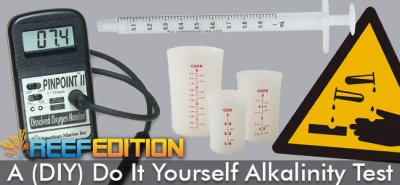
A DIY Alkalinity Test
Alkalinity is one of the most important measurements that a reef aquarist can make. It can become rapidly depleted in many aquaria, requiring frequent measurement in order to maintain stable levels. While hobby test kits for alkalinity can be simple to use, some aquarists find them either...- Randy Holmes-Farley
- Article
- 13 min read
- alk alkalinity diy do it yourself randy holmes-farley reef chemistry saltwater aqarium
- Comments: 2
- Category: Reef Chemistry
-

The Many Methods for Supplementing Calcium and Alkalinity
There is no aspect of reef aquarium chemistry more important than calcium and alkalinity. Many of my previous articles have described various aspects of these systems in detail. In reading those articles, aquarists will note one pervasive theme: that maintaining appropriate levels of each are...- Randy Holmes-Farley
- Article
- 29 min read
- 2-part alk alkalinity balling method cal calcium randy holmes-farley reef chemistry reef tank saltwater aqarium
- Category: Reef Chemistry










